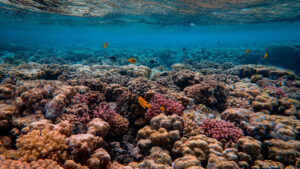Physical Address
23,24,25 & 26, 2nd Floor, Software Technology Park India, Opp: Garware Stadium,MIDC, Chikalthana, Aurangabad, Maharashtra – 431001 India
Physical Address
23,24,25 & 26, 2nd Floor, Software Technology Park India, Opp: Garware Stadium,MIDC, Chikalthana, Aurangabad, Maharashtra – 431001 India

Half of Earth’s coral reefs will be facing unsuitable environmental conditions because of climate change by 2035. This has come to light in a study by researchers at the University of Hawai’i at Mānoa which was published recently in the journal PLOS Biology. The researchers have found that under a worst-case scenario if climate change continues unabated, the underwater ecosystems face permanent damage. This will lead to a disruption in the food chain causing other marine life to struggle to survive.
The lead author of the study, Renee O. Setter who is a doctoral student in the Department of Geography and Environment in the College of Social Sciences, said that the actual impact of climate change on coral reefs is worse than widely believed. She further said that she found the result quite surprising.
“While the negative impacts of climate change on coral reefs are well known, this research shows that they are actually worse than anticipated due to a broad combination of climate change-induced stressors,” said Setter. “It was surprising to find that so many global coral reefs would be overwhelmed by unsuitable environmental conditions so soon due to multiple stressors.”
Setter and her colleagues used an ensemble of global climate change models and looked at five key factors that can put stress on coral reefs from the 1950s through the year 2100. These included sea surface temperature, ocean acidification, tropical storms, land use and human population. They used references from prior studies to calculate threshold values for the stress factors which were found to be unsuitable for the coral reefs earlier.
The study found that in 2035, if multiple stress factors are taken into consideration, half of the world’s coral reefs will become unsuitable. While higher sea surface temperature may be experienced in one region, another region might be experiencing ocean acidification, for example. On the other hand, if only a single stress factor on global reefs is considered like sea surface temperature, the impact seems to be in fewer areas and the date is pushed back to 2050.
The study also projected that by 2055, all of the world’s coral reefs would be facing unsuitable conditions based on at least one of the five stress factors taken up in the study. It was further projected that by 2100, 93% of global reefs would be under threat by two or more stress factors.
The co-author of the study, Erik Franklin who is an associate research professor at the Hawaiʻi Institute of Marine Biology in UH Manoa’s School of Ocean and Earth Sciences and Technology, said that corals are vulnerable to climate change in an increasingly warmer world.
“We know that corals are vulnerable to increasing sea surface temperatures and marine heat waves due to climate change. But it is important to include the complete anthropogenic (environmental change caused or influenced by human activity) impact from numerous stressors that coral reefs are exposed to in order to get a better sense of the overall risks to these ecosystems,” Franklin said.
This study is the first of its kind in terms of looking at multiple stress factors and projection scenarios to show how the remainder of the coral reefs may have a short life than what was previously predicted. The study is unique in the fact that it shows that these coral reefs are at risk of being affected by at least one of the many stress factors that are quickly approaching.
The researchers are next trying to find out how climate change would affect individual coral species. They will do this by identifying which kind of species are more likely to survive unsuitable conditions to emerge as climate change resilient and which may be more vulnerable. This will help them in projecting which species might be at more risk in terms of future stress factors.
Studies conducted earlier found that climate change is causing frequent marine heat waves worldwide and increasing temperatures are damaging coral reefs around the world. According to a study published in the journal PLOS Climate, at 1.5°C of warming, 99% of the world’s reefs will experience heatwaves that will prove to be fatal for them.
In terms of global warming, coral reefs are regarded as one of the first and most significant ecological casualties of the planet. Because corals have adapted to a specific temperature, warming oceans for a prolonged period might lead them to lose the colourful algae, which nourish them via photosynthesis, proving to be fatal eventually.
According to a 2018 Intergovernmental Panel on Climate Change (IPCC) report, 1.5°C of global warming would cause between 70 and 90% of the world’s coral reefs to disappear. Another major study found that the world lost about 14 percent of its coral reefs in the decade after 2009, mainly because of climate change.